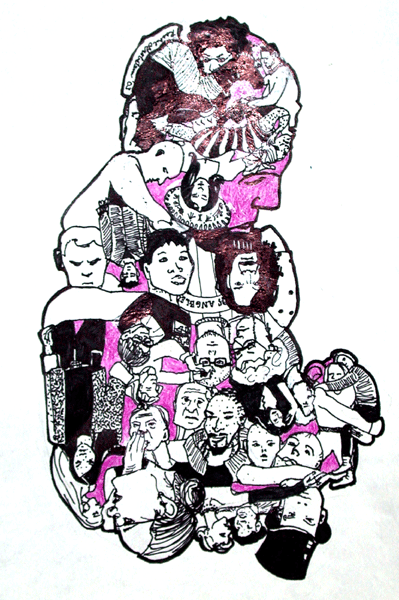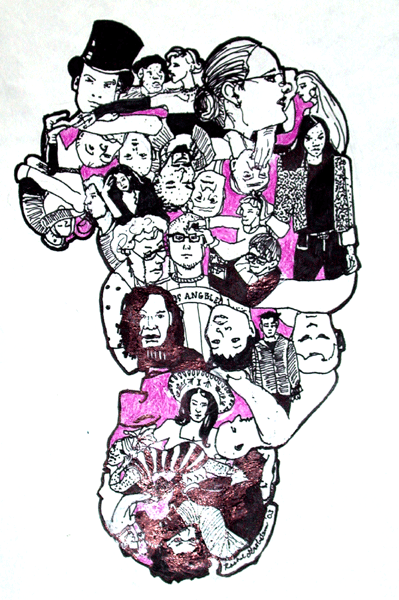Made available on Serendip
In association with Making Sense of Diversity: An Exploration, a world wide conversation

|
Summary
Prepared by Anne Dalke
Additions, revisions, extensions
are encouraged in the On-Line Forum
| 
|
Orah began by introducing herself as an American Jew, and observing that some of us may have felt intimated about joining this discussion--"because we don't know enough about this problem that has no solution." She countered by saying that "knowing can create a limited space in which we can't go beyond what we know; "we hope to create here a space where people don't know, where we can stop knowing what we know, and be open to new knowings." Laura spoke about her work with Students for Justice in Palestine, a club organized to educate about the severity of injustice against the Palestinians, which insists that basic violations of human freedom cannot be ignored. Deborah, a political scientist teaching courses on the Middle East, cautioned us that "listening and understanding don't resolve conflict"; they can lead instead to the "pessimism of understanding." She also explained her disinclination to make readings avaiable before the discussion; she wanted to avoid the notion that we can read something that will "straighten us out," or make us think that the very complicated historical situation that is the Middle East can easily be straightened out. With those caveats, and the further observation that we shoould not be discouraged from talking about where we are now, a general discussion began.
An American Jew, the great-grandson of concentration camp victims, identified himself as a Zionist who abhorred the oppression of Palestinians. He saw as intractable the two competing claims to the same land, in which both sides continually demonize each other. "I passionately love Israel, I want a Palestinian state, and I do not know how to solve this." The president of the Israeli group on campus also identified herself as a Zionist who is committed to the national liberation of the Jews, and wants (as do many socialist Zionists) a two-state solution. A Palestinian student said that she was opposed to Zionism, that the Jewish return to a homeland--Biblical Palestine, now Israel--was a violation of the Palestinian homeland and state. To return to the Middle East after an exile of 2000 years and say to those who have continued to live there in the interim, "This is my homeland," a homeland I do not want to share, a homeland where you are not wanted, a homeland where your historical ties are negated, is not acceptable. The historical and current partition between Jews and Arabs has not been a just one. Jews wanted to make their own country; they did not want to make peace. A traumatized people was put on a colonized people; the current occupiers could not have been more welcoming.
We were being very real in acknowledging that two hurt peoples were involved here.
So: the cards initially dealth were unpeaceful; can we re-arrange those cards? The two-state solution seems more appealing now that the Palestines are acknowledged as a people in the conversation. Yet it was reported that 25% of Israeli Arabs do not want to live in a multicultural state. (Is there is such a thing as a monocultural state? This area has continually been penetrated by other powers; before the British mandate there were 700 years of Ottoman rule.) But states have different ways of making rules about the relationships of different groups within their borders. The Zionist vision was of a space for Jews; they desired a place made by Jews for Jews. The exclusionary aspects of that vision (which arose at a time when Europe was bursting with nationalism) are obvious now. But the historical vision does not have to dictate "forever." This territory is claimed by two peoples as a home; this a local aspect of a more general problem. We were reminded of the our discussion two weeks ago about re-imagining customs at Bryn Mawr, in which we noted that we had all left home in order to interact with others different from ourselves; we are all strangers come together to make a village here. How seriously have we, how seriously has Israel-Palestine entertained the notion of a multicultural state?
Mention was made of the physical smallness of the space under contestation; is there any way to get out of the "closed system" defined by the geographical borders Israel-Palestine? And how important is the temporal dimension? If current occupants were deprived of all memory of past events and told, "here you are, start fresh, work out a way to live together," might they not be able to do so? Is hanging on to the past what makes this situation so intractable? Is the argument a contestation between memories? How relevant is the history of colonial intervention, and the "paternalist" interventions of the U.S. today? "Why can't we leave these people alone?" Is it the Americans who are the Zionists? Counter-observations were made about the profoundly anti-Semitic bias of the U.S. media, and comparisons to the treatment of Jews in Europe and elsewhere. Vocabulary and images have taken over so that "I am an Arab and a Jew," or the existence of "Palestinian Christians" seems an impossibility. Many Americans advocate the national liberation of Jewry, but see the national liberation of Palestinians as terrorism. With state sponsorship and representation, Palestinians have turned to more brutal measures to be heard. Palestinians feel vulnerable, because they have no representation. Is Zionism really the only protection for the Jewish people?
We did not address a number of other major issues, in part because our focus in this conversation was on personal feelings. These big issues include
-
terrorism by the state
- the role of the Palestinian leadership
- the effect of "occupation" on the occupied
- consideration of the territories.
Both Israelis and Palestinians participate in a culture of remembering; what we were recognizing in this conversation is the ways in which our historical memories hurt others. We need to continue coming together, in order to represent all sides in the conversation, to work through these memories and come to understand their consequences. Laura and Orah ended this portion of the discussion by inviting all into a sustained dialogue on Israeli-Palestine, in which participants would meet regularly, perhaps with common readings as the basis for discussion. This issue cannot be put in a box; we have to hear how we have felt--and we have to move on from those feelings. This discussion is also invited to continue on line.
"Making Sense of Diversity" will resume in person in two weeks, at noon on Friday, October 8, when Heather Davis, Maria Fernandes and Michelle Mancini will be speaking about "Sustained Dialogue: A Report and an Invitation."
| Return to Schedule for Friday Noon Conversations
| Forum
| Bryn Mawr Conversation
| General Conversation
| Serendip Home |
These pages are being maintained by Christina Florio, with support from Audrey Flattes and Nia Turner and sponsored by the Bryn Mawr College Center for Science and Society and the Serendip website. Send us additional comments or suggestions at Serendip
© by Serendip 1994-2004 - Last Modified:
Sunday, 26-Sep-2004 15:28:23 EDT

